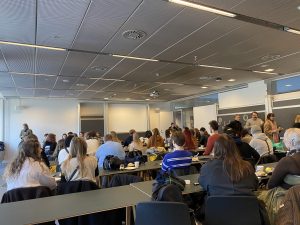Hi everyone!
Today I’m here to tell you about a week long trip to Denmark, University of Copenhagen, we had with other Nordic countries’ Korean students. At the end of the intense week spent with lectures, Q&A-time with the authors of academic papers and group discussions, many of us felt inspired by what we had learnt but also from getting to know each other. I saw how diverse the field of Korean studies can be, and how different it can look for people. I personally felt inspired to learn more Korean to help me understand the culture deeper, and to choose topics to research that I resonated with emotionally as well. I fully realized how pointless it is to study, research or write about something you aren’t truly interested in. Being interested, invested and curious about what you are learning about is they key to success, and actually enjoying what you are doing.
Now I would like to tell you about the activity many of us found to be maybe the most interesting and exciting part of our time in Copenhagen: the Model UN-training, MUN. On the first day we had the two training leaders tell us about the backdrop: international relations between the countries we would be simulating (China, Russia, North Korea, etc.) and other information about for example the countries militaries. The second day (and afternoon) was spent reading articles on our designated countries. Our team also had a brief meeting in the hostel lobby to brief each other about our findings and to make sure that our opinions and plans of future action were in line with each other.
Wednesday was when the MUN-simulation took place. We had only three hours to read our country’s role sheet, what had happened and to plan what our course of action would be, as well as message with other countries and come to a mutual agreement. Our team played North Korea, and as the simulation’s background was that North Korea had had a dangerous nuclear explosion, everything pretty much revolved around us. We didn’t have to do much before other countries came to us with an overflow of messages.
We made strategic decisions on how we acted as a country: we declined to join a global meeting, the Six-Party Talks, and we had a more passive approach otherwise as well, as we felt that fitting for North Korea. We also sent our troops to the border with South Korea when we felt threatened, to scare the other countries. That actually worked really well to our advantage, and in the end we got rid of many economic and trading sanctions. We received a lot of humanitarian help from all the countries right from the beginning, and our relationship with China remained good, with increased trade between us. One of our goals was also to keep it to ourselves that the explosion had actually just been a pure accident, not a nuclear test gone wrong as the other thought. We succeeded with that task as well, and our country’s image didn’t falter. Having China as our main buddy really helped us during this simulation.
We learned a lot about decision making as a team, international relations and how many factors there are to these things. One must always remember to think about what the other party wants in exchange, especially when they’re not being straight forward with it. I also learned a lot about teamwork and how to divide tasks between the team members so that the team can work the best it can.
Kaisa Virtanen, BA Student in Asian Studies

Picture: Copywright Kaisa Virtanen